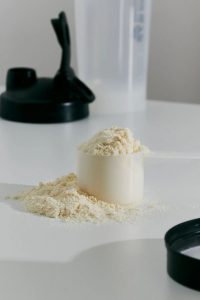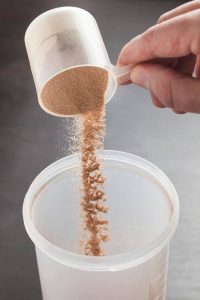
Gaining weight can be just as challenging as losing it. If you’re looking to gain weight in a healthy way, focus on creating a calorie surplus by consuming more calories than you burn. This article will discuss how protein powder can be part of a healthy weight gain plan, but it’s important to consult a doctor or licensed dietician before making any major changes to your diet.
What is Protein Powder?
Protein powder is a concentrated source of protein made from food sources like milk, eggs, soy, or rice. It comes in a variety of flavors and textures and can be mixed into liquids or blended into foods.
There are many types of protein powder available, including:
- Whey protein: Derived from milk, whey protein is quickly absorbed by the body.
- Casein protein: Also from milk, casein protein digests slower than whey protein.
- Soy protein: A plant-based protein option, soy protein is a complete protein containing all nine essential amino acids.
- Rice protein: Another plant-based protein option, rice protein is hypoallergenic and easily digested.
Can Protein Powder Help You Gain Weight?
Protein powder can be a helpful tool for gaining weight because it provides a concentrated source of calories and protein. Protein is essential for building muscle, which can help increase your weight in a healthy way.
Here are some ways protein powder can help with weight gain:
Increases calorie intake:
Protein powder adds extra calories to your diet, which can help you create a calorie surplus for weight gain.
Supports muscle growth:
Protein is necessary for muscle repair and growth. When combined with exercise, protein powder can help you build muscle mass.
Convenient source of protein:
Protein powder is a quick and easy way to add protein to your diet, especially if you struggle to meet your protein needs through food alone.
How to Use Protein Powder for Weight Gain
If you’re considering using protein powder for weight gain, here are some tips:
- Combine it with healthy foods: Mix protein powder with smoothies, yogurt, oatmeal, or other nutritious foods to add protein and calories to your meals and snacks.
- Use it post-workout: Consuming protein powder after a workout can help with muscle recovery and growth.
- Choose the right type of protein powder: Select a protein powder that suits your dietary needs and preferences.
- Start slow: Begin with a small amount of protein powder and gradually increase your intake to avoid digestive issues.
- Focus on whole foods: Protein powder should supplement a healthy diet rich in whole foods, not replace it.
Important Considerations When Using Protein Powder
While protein powder can be a helpful tool for weight gain, it’s important to consider these factors:
- Not a magic bullet: Protein powder alone won’t lead to weight gain. It should be used alongside a healthy diet and exercise routine.
- Consult a doctor or licensed dietician: Discuss your weight gain goals with a healthcare professional to ensure a safe and personalized approach.
- Potential side effects: Protein powder can cause bloating, gas, or diarrhea in some people. Start with a low dose and listen to your body.
- Not necessary for everyone: If you can meet your protein needs through a balanced diet, protein powder supplementation may not be necessary.
Protein powder can be a helpful tool for weight gain when used correctly as part of a healthy diet and exercise plan. Remember, consult a doctor or licensed dietician before making significant changes to your diet or exercise routine. They can help you create a safe and effective plan to reach your weight gain goals.

Building a Healthy Weight Gain Plan
Here are some tips for building a healthy weight gain plan that incorporates protein powder, but focuses on a well-rounded approach:
-
Focus on whole foods: Prioritize nutrient-rich whole foods like fruits, vegetables, whole grains, and lean protein sources. These foods provide essential vitamins, minerals, and fiber that your body needs for overall health.
-
Create a calorie surplus: To gain weight, you need to consume more calories than you burn. A healthcare professional or licensed dietician can help you determine a safe and appropriate calorie surplus for your goals.
-
Strength training: Building muscle mass can help with healthy weight gain. Strength training exercises target different muscle groups and promote muscle growth when combined with a proper diet. You can find many free resources online or in apps to get started with bodyweight exercises at home.
-
Track your progress: Monitor your weight and body composition over time. This can help you assess your progress and make adjustments to your plan as needed. There are many apps available to help you track your food intake and exercise routine.
Sample Weight Gain Meal Plan
Here’s a sample meal plan to illustrate how protein powder can be incorporated into a healthy weight gain strategy:
- Breakfast: Oatmeal with fruit, nuts, and a scoop of protein powder mixed in.
- Lunch: Whole-wheat sandwich with lean protein (chicken, turkey, or tofu), vegetables, and a yogurt parfait with granola and berries.
- Snack: Smoothie made with fruit, yogurt, and protein powder.
- Dinner: Salmon with roasted vegetables and brown rice.
- Snack: Cottage cheese with fruit and a drizzle of honey.
Remember: This is just a sample, and you should adjust it based on your preferences and dietary needs.

Staying Motivated on Your Weight Gain Journey
Reaching weight gain goals takes time and consistency. Here are some tips to stay motivated:
- Set realistic goals: Small, achievable goals are more motivating than trying to reach an unrealistic target weight too quickly.
- Find a workout buddy: Exercising with a friend or family member can make exercising more enjoyable and help you stay accountable.
- Track your non-scale victories: Focus on how your clothes fit, your energy levels, and your overall strength gains alongside weight gain.
- Reward yourself for reaching milestones: Celebrate your progress along the way with healthy rewards, like a new workout outfit or a fun activity.
Conclusion
Gaining weight in a healthy way takes time and effort. By focusing on a well-balanced diet, strength training, and potentially using protein powder to supplement your protein intake, you can achieve your weight gain goals. Consulting a doctor or licensed dietician can help you create a personalized plan that fits your needs and ensures you’re getting the proper nutrients for overall health.








